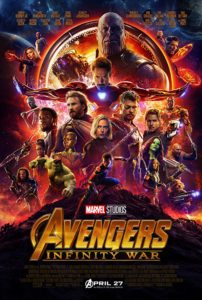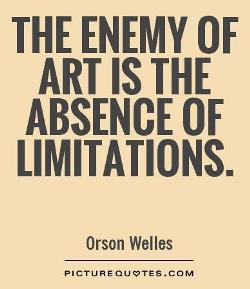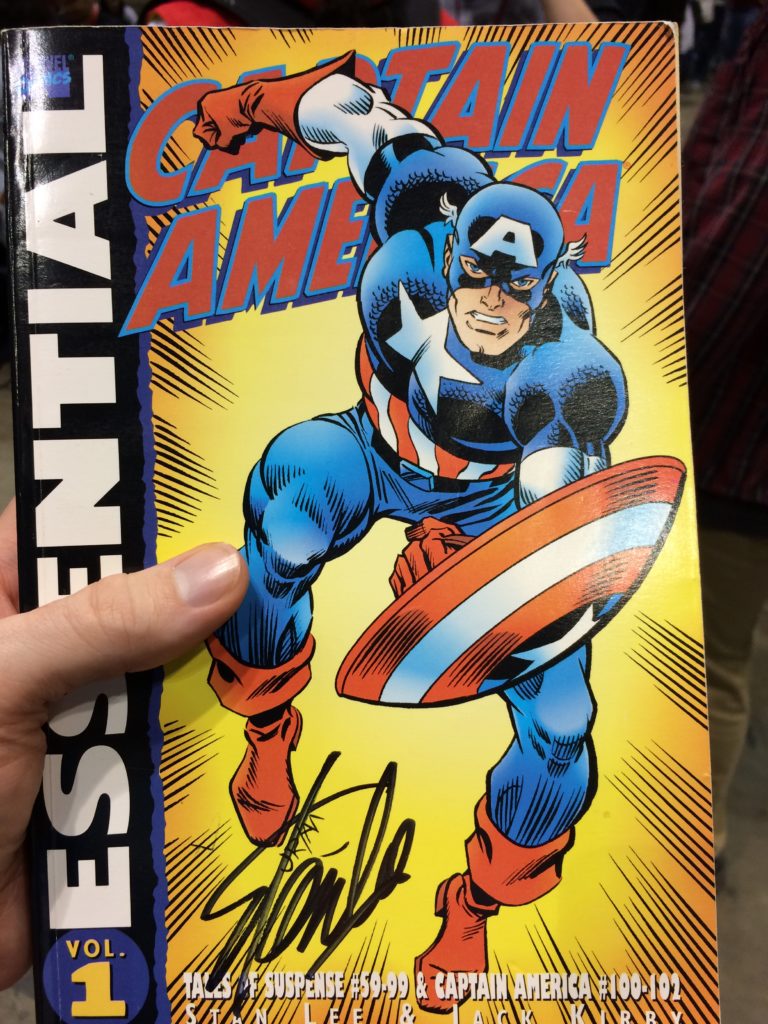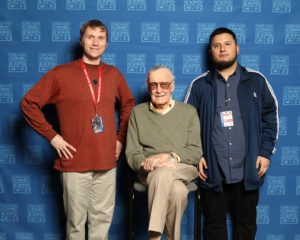I’m back with another superhero movie trailer reaction! This time it’s for a Marvel production: namely, Fantastic 4: First Steps. I have opinions because I’m the voice of Johnny Storm for Scyther Podcasts . What’d I think of it? Watch and find out! (FYI: Streamyard cut the sound from the trailer. That was on me).
Tag Archives: marvel comics
42: In Remembrance of Captain America
While at JAFAX a few weeks ago, my friend, Eric Anderson of Nerd Chapel, and I took a few minutes for me to read one of my entries in our Christian devotional for geeks and nerds, 42: Discoverintg Faith through Fandom.
Digression 18: Farewell, Stan Lee
“Digression 18: Farewell, Stan Lee”
Hosted by Nathan Marchand
It’s been over a month since comic book legend Stanley Lieber (aka Stan Lee) died. I recorded this video the week of his death, but I was unable to edit and post it until now. It’s appropriate since today would’ve been his 96th birthday. I share my memories of his many stories and characters, my experience of meeting him, and why he inspires me as a writer.
What are your memories of Stan? Leave them in the comments below.
A Moonlighting Ninjas Media Production
(c) 2018 Nathan Marchand
My (Spoiler-Free) Review of ‘Avengers: Infinity War’

It’s been a while since I blogged, so I figured a review of the biggest nerd movie of 2018 would be a great way to get back into the swing of things.
To quote Buzz Lightyear, “To Infinity…and beyond!”
This is the best Marvel Cinematic Universe film. Ever. Of all time. (Well, for now, anyway). For the first time, I went into an MCU movie not sure what to expect, and after seeing it, I’m unsure what Marvel will do next because there’s a lot of things they could do. Even with my knowledge of the comics that inspired this film (The Infinity Gauntlet and, to much lesser extent, Infinity War), I’m not sure what will happen next. With Disney trying to finalize a deal to buy out 20th Century Fox, that means Marvel will reacquire the film rights to the X-Men and Fantastic Four. The possibilities are endless!
I was concerned that Thanos wouldn’t be a villain worthy of a decade of build-up.
Boy, was I wrong.
He has eclipsed Loki as the best villain in the MCU. He’s altered from the comics, which is understandable given that what comic fans love about Thanos was developed for many comics over many years, and that’d be hard to condense into a film that’s already huge. Heck, he’d need his own movie to get there. He’s gone from a lovesick Eternal trying to win the affections of Mistress Death to a madman with a noble cause. There’s even some tenderness from him. Josh Brolin’s performance with the mo-cap is incredible. I never thought I was watching a special effect.
My sister described the film as “a bit ADD.” I can see why. At 2 ½ hours, it’s a long movie with 64 characters from 18 other films. Yet while it bounces back and forth between several groups of characters, I never felt like it shortchanged anyone or was moving too fast. Everyone gets a moment of awesomeness. The film masterfully juggles several tones, including traditional superhero, mythic, and space opera comedy. They all blend perfectly. I attribute this to the Russo Brothers and screenwriters Christopher Markus and Stephen McFeely, who might be the best creative team in the MCU.
Without giving any spoilers, this is a film that will shock audiences. Even I was taken aback by the ending. I knew it had to happen, since I knew this was part one of a two-part story and I’ve read the comics, but it still surprised me with how boldly un-Hollywood-like it was. It didn’t affect me as much as Logan did, but that was a superhero film about finality. There isn’t nearly as much of that here.
I want to see this in IMAX. I bet it would look great. I don’t normally see movies more than once in a theatre, but this is one I’d gladly see again. That’s how much I love it.
My only problem with the film is it does and doesn’t stand alone. While it explains the many characters just enough to give context, you have to have seen a lot of the previous MCU films to understand it fully. The more you’ve seen, the more you’ll get out of it.
My opinion of this film may change with more viewings. Right now I’m just basking in the excitement.
To summarize: It’s one of the best superhero films ever made.
What’d you think of Avengers: Infinity War? Feel free to leave comments—including spoilers—below. I could talk about this film for hours and would love to include you all in the conversation.
Creativity Thrives on Limitations
I wrote this blog a head of time because I’m at Gen-Con 50 this weekend. Come visit me at my table in Authors Avenue!

Reboots are all the rage now, especially at the cinema. I’ve heard it said that the biggest reason for this is because it allows creators the “freedom” do something new without the constraints of continuity; they don’t have to be limited by what has come before. In other words, they can do whatever they want.
But is that such a bad thing?
Case in point: the infamous Spider-Man storyline One More Day. The creators at Marvel Comics (the supposed “House of Ideas”) had complained for years that they wished Peter Parker (aka Spider-Man) hadn’t married Mary Jane Watson back in the mid-1980s. Why? Because they claimed they couldn’t think of enough good stories for a married Spider-Man. Seriously. Did they think all of life’s excitement was gone after getting married? Must stories always include sexual tension and unrequited love? Anyway, to “remedy” this, they didn’t just have them get a divorce. No, that meant they didn’t love each other. Instead, Peter and MJ made a literal deal with the Devil to erase their marriage from continuity. To save Aunt May’s life because she was dying from a gunshot meant for Peter.
Dumbest. Idea. Ever!
I quit reading Spider-Man comics after that. From what I’ve heard, Peter Parker, now a 30-year-old single, spends a lot of his time whining about being alone. (Cue eye roll).
Most fans hated this story, and rightfully so. It was a character assassination done by the creators to serve themselves and not the readers. All because they didn’t want the constraints of writing a married Spider-Man.
Recently at a Children of the Wells creative meeting, my friend/collaborator Nick Hayden mentioned that writing for our serial, with all its continuity and parameters, forced him to be a better writer. It required that he keep consistent with what was written before and follow the rules we’d set down for the world. In many ways, since not all of the characters he created and since the ones he did create had changed since he last wrote them, he was a caretaker for these story and characters. They weren’t entirely his, so he had to be more careful with them. Beyond that, though, it required that he dream up ideas that worked with what had been written before as opposed to going with whatever came into his head.
There are constraints in most creative endeavors. Even improv comedy has to have parameters. It gives the performers a framework from which to work, a way to focus their creativity. If they were sent on stage with no direction, they’d either come up with nothing or not say anything funny, most likely.
Are there times when creators should start fresh? Yes. But that should be done in such a way that respects what came before, respects the characters, and respects the readers.
Do you think creativity thrives within restrictions? Why or why not?
Meeting Stan Lee
I scratched an item off of my bucket list Saturday.
If you were following me on my social media this past weekend, you know that I attended C2E2, a convention held in Chicago, to meet comic book legend Stan Lee, the creator of most of the Marvel Comics universe. I would rank Mr. Lee among the top five most influential writers on my life. Indeed, Mr. Lee might be among the most impactful writers of the last fifty years.

After a harrowing three-hour trip with my friends Sergio and Jude (which included breakfast at IHOP, a brief Walmart run, and a shorter-than-expected battle with traffic), we arrived at McCormick Place. We got tickets and the lay of the land, so I changed into my Captain America cosplay and hurried to a huge auditorium for Mr. Lee’s panel with fellow creator Frank Miller (who I like but not nearly enough to bother meeting since the man is now insane). I was concerned I wouldn’t get in because it was crowded. You see, Mr. Lee is 94 years old(!), and 2017 is his last year for appearing at conventions, so this would be the last time most people would get to see him in person. I passed the time making friends with my “line-mates” (a word I coined that day), including a 20-something Chicago girl standing behind me. Thankfully, we made it in.
Unfortunately, the panel started 20 minutes late due to technical difficulties. My annoyance was drowned by my excitement, though. Mr. Miller came out first, but it was Mr. Lee who got the biggest cheer. What’s hilarious is the Chicago girl and I had joked about how it’d be hilarious if Mr. Lee passive-aggressively mocked Mr. Miller—and he did! In fact, Mr. Lee spent much of his time roasting Mr. Miller, making fun of his artwork and writing and his comic series Sin City, among other things. Mr. Lee also made frequent comments about how his eyesight was fine but his hearing was going out, so he couldn’t hear Mr. Miller or the moderator when they spoke into microphones (which he demonstrated by making garbled sounds), but he could hear them when they didn’t speak into mics.
My favorite moment (besides the Mr. Miller roasting) was his story about creating Spider-Man. At first I didn’t want to hear it because it’s a story I’ve heard from him in interviews many times, but he put a new spin on it. He was told by his editor to create a new hero, and when Mr. Lee was sitting at his desk to write, he saw a fly on the wall and thought it’d be “groovy” to have a hero who could stick to walls. He decided to call him Spider-Man and make him a teenager with lots of personal problems. He took that to his editor, who shot it down, saying, “You can’t call him Spider-Man! People are scared of spiders! You can’t make him a teenager because teenagers are always sidekicks! He’s a hero! Heroes don’t have personal problems!” Here’s the part I never heard before, though: Mr. Lee disregarded what his editor said and sent it to the printer because it was going into the final issue of Amazing Fantasy #15 and he figured no one would remember it. The next month, sales figures came in and showed that was the bestselling book that month, so the editor told Mr. Lee, “Remember that hero you made that we liked? We’re giving him his own series!”
Tenacity and guts. I love Stan Lee.
I realized during that panel that Stan Lee is the most endearing cranky old man ever. If anyone could be granted immortality, I hope it’s him.

My primary goals for the day after that were to get his autograph and a photo with him. I’d bought a photo-op in advance, but I had to stand in line for the autograph—for 2 ½ hours! It was much like waiting to ride a roller coaster at Cedar Pointe: multi-hour wait for a 60-second thrill. Was it worth it? Oh, heck yes! Again, I made friends with my “line-mates,” several of whom want to check out my books. (Hello to you, new readers!) If I got the chance, I wanted to ask Mr. Lee one of two questions. One wasn’t related to his work while the other was somewhat related. Regarding the former, a lesser-known fact is that Mr. Lee has been married to his one and only wife, Joan, for nearly 70 years(!), so I was gonna ask him what was the secret to a lasting marriage. If not that, I was just gonna ask him for writing advice. However, the organizers had to move the line fast, so I was only able to say, “Hello, Mr. Lee,” to him. Even then, there were two guys sitting on either side of him who had to point me out to him when I said that while he was signing my copy of Essential Captain America, Vol. 1. I guess he really is hard of hearing. He did smile at me, though.
Finally, there was the photo-op. Sergio joined me for that. He’d insisted the day before that he would not join me if I wore my costume, all but demanding that I “dress formal” for Stan Lee out of respect. I got the message, although my garb is more semi-formal. Anyway, it wasn’t nearly as long of a wait for the photo-op, but it was a brief meeting. This time, though, Mr. Lee said, “Hi, fellas!” to us. Sergio boldly went stepped forward and shook his hand, so I did the same, unsure if we were allowed to do so. Nobody said anything. The photo was snapped, and we hurried out.

So, there you have it. I sacrificed going to Indiana Comic-Con the week before to meet their multitude of amazing guests and missed the chance to meet most of the multitude of other guests I liked at C2E2, but it was worth it.
As Stan Lee always says, “Excelsior!”
But I Digress…, Episode 36: A Review of ‘Captain America: Civil War’
“But I Digress…”
Hosted by Nathan Marchand
After a host of delays and problems filming this video, I’ve *finally* completed it–a month after the movie in question was released. Sorry.
Anyway, my buddy Sergio and I tackle what is arguably one of Marvel’s greatest films after some crazy (and schlocky) shenanigans.
Additional Music Credit: “There was a Hole Here” by The Wingless
My more timely text review: http://www.examiner.com/review/civil-war-is-marvel-s-best-film-yet
Did you enjoy the film? What are your thoughts on it?
Please subscribe, comment, and share!
NERD RAGE! Episode 1: Captain America Hails HYDRA!?
“NERD RAGE!”
Hosted by Nathan Marchand
In light of the recent revelation that, apparently, Captain America–one of my favorite superheroes–has always been a supervillain, I decided to launch a new show called “NERD RAGE!” This show will focus on me ranting about any stupid decisions made in media and/or the nerd and geek community. This episode features my friend and frequent co-host Sergio Garza. “NERD RAGE!” will have an irregular schedule and have episodes posted sporadically.
What do you think of Marvel’s decision to make Cap a HYDRA agent?
#SayNoToHydraCap
But I Digress…, Episode 34: My Top 5 Favorite Films of 2015
“But I Digress…”
Hosted by Nathan Marchand
I’m a little late to the party with this one, but in this episode, I discuss my top five favorite films of 2015. I even get a visit from Nerdimus Prime–who is suddenly *not* an alternate mode for me. Weird.
Does my list match yours? What were your favorite films from the past year?
Avengers: Age of Ultron text review.
Star Wars: The Force Awakens text review.
Please comment, subscribe, and share!
But I Digress…, Episode 31: A Review of ‘Fantastic Four’ (2015)
Hosted by Nathan Marchand
